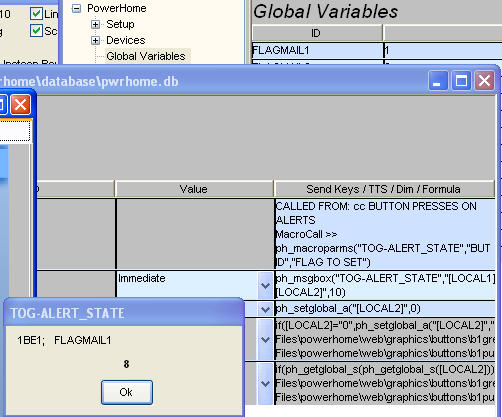| Author |
|
GadgetGuy
Super User


Joined: June 01 2008
Location: United States
Online Status: Offline
Posts: 942
|
| Posted: January 18 2009 at 20:17 | IP Logged
|

|
|
OK. Time to go to the well again.
After 5 hours of fighting a “bug” that makes no sense, I’m tapped out and not making any progress and need another pair of eyes.
The following appears to be fully correct to me but doesn’t work. All I am trying to do is set a Global Variable to a “1” or a “0”. In the following example I’m just simply trying to make it “0”.
The 3rd line ph_setglobal_a(“[LOCAL2]”,0) does not work even though LOCAL2 appears to be correctly set to “FLAGMAIL1” as evidenced by the msgbox message (seen at bottom left of picture and produced by Line 2 of macro). Yet the Global variable FLAGMAIL1 never changes as noted in the Global Variables window behind everything.

If I change the 3rd line to ph_setglobal_a(“FLAGMAIL1”,0) then all works fine.
Since [LOCAL2] contains the correct value of FLAGMAIL1 then why in the world is it not working?
BTW I have tried quotes and no-quotes around the [LOCAL2] string with no change in results.
__________________
Ken B - Live every day like it's your last. Eventually, you'll get it right!
|
| Back to Top |


|
| |
TonyNo
Moderator Group


Joined: December 05 2001
Location: United States
Online Status: Offline
Posts: 2889
|
| Posted: January 18 2009 at 20:39 | IP Logged
|

|
|
LOCAL2 is a Local, not a Global. 
Use ph_setvar_a(1,2,0), where 1 means LOCAL, 2 is which LOCAL, and 0 is your value.
|
| Back to Top |



|
| |
nadler
Super User

Joined: February 25 2006
Location: United States
Online Status: Offline
Posts: 354
|
| Posted: January 18 2009 at 20:53 | IP Logged
|

|
|
Can I suggest trying ph_setglobal_s( "[LOCAL2]","0").
Also try ph_setglobal_a("[LOCAL2]","0").
If the above don't do what you need to do, try -
ph_setglobal_a(ph_getvar_n(1,2),0)
PH stores all data as strings and converts them to any
data type when it retrieves the data. While that
doesn't explain why your example doesn't work, I have
sometimes run into the same issue, so I switched to the
3rd example and it always works.
Oh another thing I learned the hard way - make sure to
press F5 and save your changes. Exit the macro - go to
another and come back. Sometimes the Local variables
seem to be cached and unless you clear them by exiting
the macro the next time you run the macro it reports the
old value. I thought this was idiosyncratic to my
machine but maybe not.
|
| Back to Top |


|
| |
GadgetGuy
Super User


Joined: June 01 2008
Location: United States
Online Status: Offline
Posts: 942
|
| Posted: January 19 2009 at 07:12 | IP Logged
|

|
|
TonyNo - sorry I was not totally clear. The [LOCAL2] variable is the second argument to the subroutine where my problem line of code resides. Thus its use in this case should be valid as I was trying to use [LOCAL2] which contained the name of the GLOBAL variable, to set/clear the GLOBAL variable itself.
Nadler - I had experimented and it appeared that using a quoted ("0") vs an unquoted (0) zero made no difference.
To make long story short, I found the problem.
It was interesting, so I report back here to help anyone else that might encounter such an issue.
In the macro that called my problem macro above, I had pushed a new value to my GLOBAL using ph_setglobal_s("1") [which made the data type a "string"].
Then in the daughter macro above I was trying to use a "numeric" data type.
For some reason PH automatically did the data type conversions OK when the GLOBAL name was used directly, but not so when the name was passed as a LOCAL variable.
Once I discovered this, I changed the calling macro to use the ph_setglobal_a() function, and all is now working smoothly. 
{Dave - something to check into in your interpreter?} 
__________________
Ken B - Live every day like it's your last. Eventually, you'll get it right!
|
| Back to Top |


|
| |
|
|

 Active Topics
Active Topics  Memberlist
Memberlist  Search
Search 
 Topic: I’m Going Crazy!
Topic: I’m Going Crazy!



